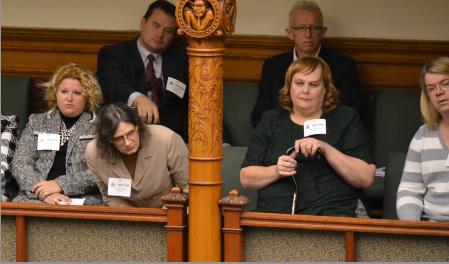
Trans activist Susan Gapka. Credit: Xtra file photo

Trans activists watch as Attorney General Chris Bentley dismisses the 2010 attempt to amend the Ontario Human Rights Code to include gender identity. Credit: Andrea Houston
Talia Johnson is nervous about travelling. One look at her passport tells border guards everything they need to know about her gender status.
Johnson, who has had her name legally changed, now wants to change the sex designation on her passport – a simple correction from “m” to “f” – to ensure all her documents accurately reflect her gender.
The federal government says trans people must undergo sex reassignment surgery (SRS) or provide a letter guaranteeing the procedure will take place within a year.
The Ottawa resident has not yet had SRS, mainly due to the financial cost of the surgery. She would also have to take time off work and travel to Toronto. “The Centre for Addiction and Mental Health [CAMH] in Toronto is the only organization in Ontario that offers SRS. There is a long wait and it’s not easy to get.”
“The status now is I don’t have a passport. Without the sex designation change, trans people are put in constant danger while travelling under the assumed sex. At this point in my life, I will have trouble if I travel.”
Susan Gapka, chair of the Trans Health Lobby Group, has been working on this issue for years. Her group is pushing to make transitioning easier by opening up access to SRS and removing the red tape around changing legal documents.
“If your legal documents don’t match at the border, there could be problems,” Gapka says. “I have had bad experiences at the airport. You can be singled out for looking different. A police officer could ask questions. It opens the door to harassment and discrimination.”
Likewise, Gapka and Johnson both agree that surgery does not determine whether a person is trans.
Gender identity is complex, Gapka says. At the root is an understanding that a person’s sex is biologically determined, but for trans people, there is a mismatch between body and gender.
Transition is fluid and can take many forms over a number of years. Some trans people never undergo surgery; some simply “pass” or choose to play with gender roles. For others, hormones are enough. Each experience is unique.
Gapka says this is a concept the federal government can’t seem to grasp.
“There’s a lot of variables when it comes to transsexual surgery,” she says. “There are differences between surgery for trans men and trans women . . . We really need to make it easier for people’s legal documents to match who they really are.”
Passport Canada declined an interview with Xtra. Instead, spokesperson Béatrice Fénelon sent an email response that confirmed the current policy. If the applicant has not undergone SRS, medical documentation must be provided stating that the applicant will be undergoing surgery in the next 12 months.
Changing sex designation on legal documents is an ongoing fight between the trans community and all levels of government, Gapka says. The law is forcing people to be dishonest, she says. The system should make it easy for people to update their legal documents.
Gapka would like to see the system harmonized and modernized. “We have a passport that uses one criteria; we have a driver’s licence in Ontario that uses a different criteria, then other ID like the birth certificate, which uses a different criteria.”
At the provincial level, activists are pushing to change the Vital Statistics Act, which is the governing document for all personal statistics. “The name, sex, place of birth and the parents are all recorded at birth,” says Gapka.
In Ontario, the government requires a medical letter confirming SRS before allowing a change in the birth certificate. Government policies for other documentation vary, but many ask for medical proof that the individual is transsexual rather than accept self-identification.
“It should be easy for people. These regulations are 30 to 40 years out of date,” says Gapka.
NDP MPP Cheri DiNovo (Parkdale–High Park) is tabling Bill 70, Toby’s Act, for the fourth time on Feb 21. The bill will insert “gender identity” into the Ontario Human Rights Code. Once that happens, the door will open for a challenge to other rules, like those that govern the vital statistics on legal documents, she says.
“That’s the first thing that needs to happen because it all comes from that,” says DiNovo. “The bill will allow challenges to anything that isn’t inclusive for trans folks. If you can’t discriminate on the basis of gender identity under the OHRC, then accommodation will have to be made in terms of everything else, and documentation is part of that.”
DiNovo sounds confident that the “fourth time’s a charm.” This time, there’s a minority Liberal government that appears to be supportive. “I am even confident some Conservatives will vote for it as well.”
The last time DiNovo tabled the bill was in 2010, but it was dismissed by then-attorney general Chris Bentley because, he said, protection was “implied.”
The bill will make it easier for trans people to access SRS surgery and will toughen up the language to ensure people are not discriminated against on the basis of their trans status for employment, housing and government policy, she says. “Things will open a lot wider in Ontario.”
Medical coverage for SRS varies across Canada. Some provinces cover procedures fully; some provinces don’t. Some offer only partial coverage, and some provinces cover related therapies. Some provinces cover nothing at all.
SRS was first listed by OHIP in 1971, but then-premier Mike Harris cut the funding in 1998. The procedure was relisted under the Ontario Liberals in 2008. At the time, the minister of health, George Smitherman, said eight to 10 people undergo SRS every year at a total annual cost of about $200,000.
Trans people are some of the most marginalized in the queer community and have been fighting for increased protection, DiNovo says. “Poverty and suicide rates are extremely high in the trans community. There’s no question that transphobia is out there and it’s virulent. We have to do everything possible to make the world a safer place.”
DiNovo hopes that the bill doesn’t even get to second reading and that instead, the government ushers it in as soon as possible. “So this will be a legislative kick in the rear for the Liberal cabinet.”
“If McGuinty wants it, it could be law before the session begins in the spring, just in time for Pride. On the 25th anniversary year of sexual orientation included in the OHRC, this would be a really nice way of celebrating that.”

 Why you can trust Xtra
Why you can trust Xtra


